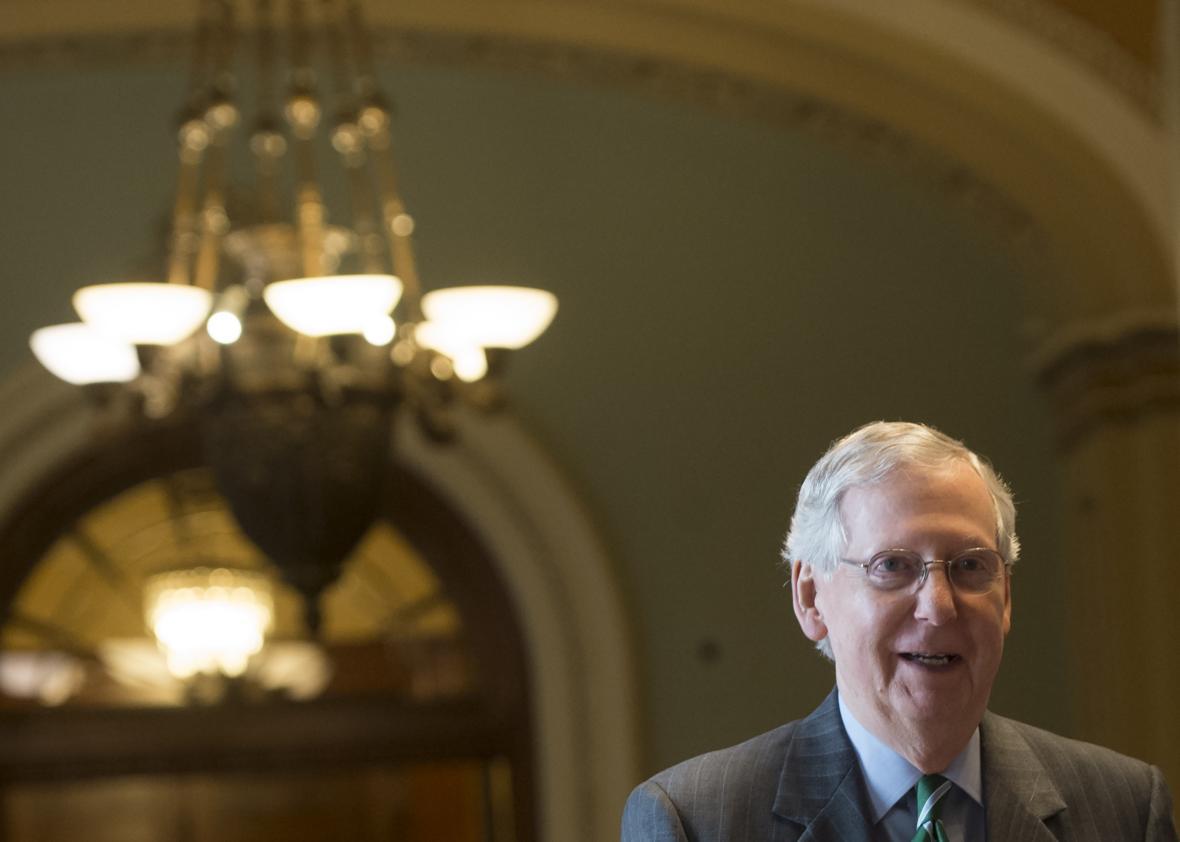
AFP/Getty Images
The Congressional Budget Office confirmed on Monday that Republicans are incapable of writing a humane health care bill. The Senate’s Better Care Reconciliation Act, which it revealed to the public on Friday and may vote on this week, would leave 22 million additional Americans uninsured within a decade, according to the CBO, largely by cutting both Medicaid and subsidies for private insurance in order to fund extravagant tax cuts for the wealthy ($536 billion of them, in fact).
Technically, that number is a slight improvement over the GOP’s previous efforts. The CBO forecast that the American Health Care Act, which the House passed last month after crafting it in a shambolic rush, would eventually leave 23 million uninsured in order to provide tax relief to investors and medical device–makers.
That is pretty much all anybody needs to know about the Republican Party’s push to repeal Obamacare—every piece of legislation the party produces amounts to a wealth transfer from the vulnerable to the rich that lowers premiums, though just slightly, for some younger and healthier Americans.
But it’s worth lingering on one specific portion of the Senate bill: the cruel bait and switch it pulls on America’s poor.
Reading extremely charitably, one could make the case that the Senate bill is designed to move low-income Americans off of government insurance and into highly subsidized private coverage. It unwinds Obamcare’s expansion of Medicaid, which allowed adults to qualify for the program if they earned up to 138 percent of the poverty line. But it also imitates Obamacare by providing tax credits to help low- and middle-income households buy private insurance, capping their premiums as a percentage of their earnings. A woman in poverty would have to pay no more than 2 percent of her paycheck toward her health insurance, for instance. A woman making 133 percent of the poverty line would pay 2.5 percent. It’s a worse deal than Medicaid, which is generally free, but it’s something.
Except there’s a catch. Obamacare’s tax credits were designed to cover the cost of midpriced health coverage; meanwhile, the law provided additional subsidies that drastically lowered out-of-pocket expenses like co-pays and deductibles for poorer households. The Senate bill spends $424 billion less on subsidies and designs its tax credits to cover the price of a low-end health plan with high deductibles—similar to one of Obamacare’s bronze plans—while doing nothing to keep down out-of-pocket costs for the needy.
As a result, poor would be unable to use the coverage they could actually afford and unable to afford the coverage they could actually use. For example, a single adult making $11,400 in 2026 would only have to pay $300 per year in premiums for a benchmark health plan. But their deductible would amount to more than half their income. “Despite being eligible for premium tax credits, few low-income people would purchase any plan,” the CBO concludes.
Ironically, this is exactly the same complaint middle-class families who currently don’t qualify for subsidies have had about Obamacare. The Senate bill does relatively little to help them while putting poor households in exactly the same predicament. It takes the worst pain some unlucky families have experienced under Obamacare and replicates it, over and over.
Some Senate Republicans clearly want to at least look as if they have compassion. Otherwise, they wouldn’t have bothered aiming the BCRA’s tax credits at the poor. After all, the House bill didn’t; instead, it provided mostly flat subsidies based on age. But just like their colleagues in the lower chamber, Senate Republicans are too wedded to the dogma of tax cuts to properly fund a health care bill that provides for the vulnerable. Their legislation is just a variation on the same heartless theme we’ve been listening to for months.